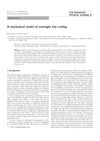 14 citations,
October 2000 in “Genomics”
14 citations,
October 2000 in “Genomics” Rat dermal papilla cells have unique genes crucial for hair growth.
 13 citations,
August 2020 in “Frontiers in Immunology”
13 citations,
August 2020 in “Frontiers in Immunology” Gamma delta T cells in the skin help with healing and defense but can also cause autoimmune issues, and more research is needed to understand how they are activated.
 5 citations,
May 2023 in “Frontiers in immunology”
5 citations,
May 2023 in “Frontiers in immunology” Environmental factors like diet and vitamin levels, especially Vitamin D, can affect autoimmune diseases differently, with lifestyle changes potentially improving outcomes.
 May 2024 in “Research Square (Research Square)”
May 2024 in “Research Square (Research Square)” PCOS increases sexual pain distress in infertile women.
 July 2018 in “British Journal of Dermatology”
July 2018 in “British Journal of Dermatology” Mindfulness reduces anxiety and depression in skin disease patients; dermatologists and psychiatrists often lack confidence in treating psychodermatological conditions.
 September 2017 in “Plastic and Reconstructive Surgery – Global Open”
September 2017 in “Plastic and Reconstructive Surgery – Global Open” Some migraine sufferers had no more headaches after getting a hair transplant.

Elastin-like recombinamers show promise for better wound healing and skin regeneration.

Vitamin D is crucial for skin health and managing skin diseases.
 September 2015 in “The European physical journal. E, Soft matter and biological physics/The European physical journal. E, Soft matter”
September 2015 in “The European physical journal. E, Soft matter and biological physics/The European physical journal. E, Soft matter” Longer time setting curls overnight leads to better curl retention.
 February 2014 in “Medicine - Programa De Formación Médica Continuada Acreditado”
February 2014 in “Medicine - Programa De Formación Médica Continuada Acreditado” The document concludes that non-scarring alopecias can be reversed, but scarring alopecias cause permanent hair loss.
214 citations,
April 2017 in “Cell” Different small areas within hair follicles send specific signals that control what type of cells stem cells become.
189 citations,
July 2009 in “The Journal of clinical investigation/The journal of clinical investigation” Epidermolysis bullosa simplex causes easily blistered skin due to faulty skin cell proteins, leading to new treatment ideas.
88 citations,
August 2019 in “Frontiers in immunology” Tyrosine kinases are important in skin autoimmune diseases and could be targets for new treatments.
26 citations,
April 1998 in “Journal of Investigative Dermatology” Sunscreens with higher SPF and UVA filters offer the best protection against skin aging from UVA rays.
 18 citations,
October 2021 in “Frontiers in Physiology”
18 citations,
October 2021 in “Frontiers in Physiology” Lipocalin-Type Prostaglandin D2 Synthase (L-PGDS) is a protein that plays many roles in the body, including sleep regulation, pain management, food intake, and protection against harmful substances. It also affects fat metabolism, glucose intolerance, cell maturation, and is involved in various diseases like diabetes, cancer, and arthritis. It can influence sex organ development and embryonic cell differentiation, and its levels can be used as a diagnostic marker for certain conditions.
 15 citations,
January 2021 in “Journal of Materials Chemistry B”
15 citations,
January 2021 in “Journal of Materials Chemistry B” Silk nanofiber hydrogels help stem cells heal wounds faster and improve skin regeneration.
8 citations,
May 2020 in “Arthritis research & therapy” DHT inhibition may increase spinal bone growth in ankylosing spondylitis.
 1 citations,
January 2022 in “BMC Genomic Data”
1 citations,
January 2022 in “BMC Genomic Data” The study found that androgen receptors in skin cells mainly affect the focal adhesion pathway and control the caveolin-1 gene, with implications for new treatments for related diseases.
 1 citations,
March 2024 in “Science”
1 citations,
March 2024 in “Science” Vitamin A helps skin stem cells decide their function, aiding in hair growth and wound repair.
 1 citations,
March 2022 in “IntechOpen eBooks”
1 citations,
March 2022 in “IntechOpen eBooks” Collagen is crucial for health and treating certain diseases, and supplements can improve skin, nails, and hair conditions.

Ajuga reptans L. extracts have strong antioxidant, anti-inflammatory, liver-protective, antimicrobial, and wound-healing properties.
February 2023 in “European biophysics journal” 50 citations,
April 2010 in “Biology direct” Low androgen levels might delay prostate cancer but could lead to more aggressive, therapy-resistant cancers.
 24 citations,
March 2017 in “Archives of Gynecology and Obstetrics”
24 citations,
March 2017 in “Archives of Gynecology and Obstetrics” The study found that women with hyperandrogenic PCOS have higher levels of AKT1 and AKT2 proteins in their cells, which may lead to cell dysfunction.
 23 citations,
May 2019 in “Expert Opinion on Therapeutic Patents”
23 citations,
May 2019 in “Expert Opinion on Therapeutic Patents” New androgen receptor modulators show promise for treating diseases like prostate cancer and muscle wasting.
 18 citations,
February 2018 in “International Journal of Molecular Sciences”
18 citations,
February 2018 in “International Journal of Molecular Sciences” PGD2 increases androgen receptor activity in hair cells, which could be targeted to treat hair loss.
 17 citations,
January 2015 in “MedChemComm”
17 citations,
January 2015 in “MedChemComm” New treatments for prostate cancer are less toxic and show promise, but more research is needed to enhance their effectiveness and reduce side effects.
 14 citations,
November 2014 in “European journal of medicinal chemistry”
14 citations,
November 2014 in “European journal of medicinal chemistry” Researchers found new potential treatments for conditions related to the androgen receptor, like male hormonal contraception, by testing thousands of compounds.
![Synthesis, Biological Evaluation, and Molecular Docking of 4-Amino-2H-benzo[h]chromen-2-one Analogs Containing the Piperazine Moiety](/images/research/2ecf4eed-7dbe-4f1a-83db-739625546cdd/small/31808.jpg) 7 citations,
August 2019 in “Bioorganic & medicinal chemistry”
7 citations,
August 2019 in “Bioorganic & medicinal chemistry” Analog 23 is a promising compound for prostate cancer treatment.
 1 citations,
May 2001 in “Journal of Labelled Compounds and Radiopharmaceuticals”
1 citations,
May 2001 in “Journal of Labelled Compounds and Radiopharmaceuticals” Scientists at the University of Michigan Medical School successfully created a special compound that can be used to improve imaging of prostate cancer.






















![Synthesis, Biological Evaluation, and Molecular Docking of 4-Amino-2H-benzo[h]chromen-2-one Analogs Containing the Piperazine Moiety](/images/research/2ecf4eed-7dbe-4f1a-83db-739625546cdd/small/31808.jpg)
